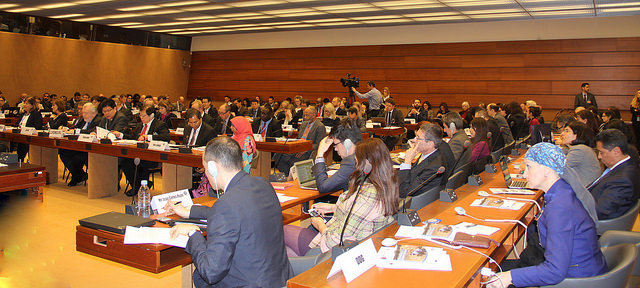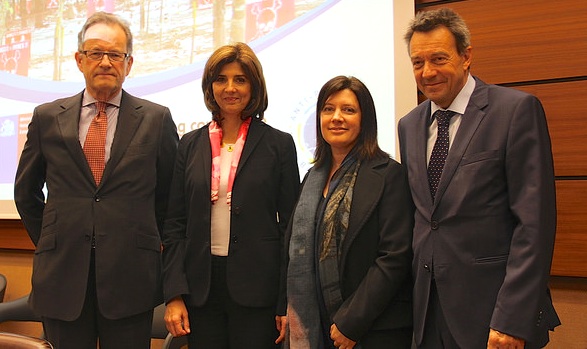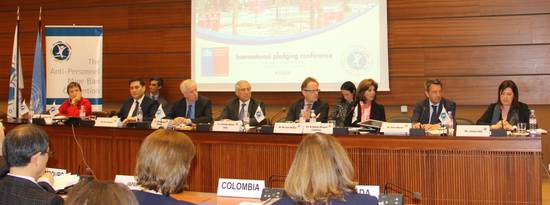|
07.03.2016
International Pledging Conference Summary
Download the press summary on pdf.
|
 51 States Parties, 2 States not party and 15 Organizations participated at |
|---|
"We are thankful to the States Parties for their pledges towards the work of the Implementation Support Unit," said the ISU's Interim Director, Juan Carlos Ruan.
"We have received pledges from long-term and traditional supporters as well as from mine-affected States themselves. This highlights the importance that mine-affected States assign to our work, which includes providing them with advise and technical support in the process of implementing key obligations of the Convention such as mine clearance, stockpile destruction and victim assistance.
The ISU core work also includes advising and supporting the Convention's committees and servicing annual meetings where the international community can take stock of what has been achieved and the challenges that remain," said Juan Carlos Ruan.
PRESS SUMMARY
Anti-Personnel Mine Ban Conference Pledging Conference
Geneva, 3 March 2016
- Hosted by Chile at the United Nations in Geneva and under the patronage of H.E. Heraldo Muñoz, Minister of Foreign Affairs of Chile, and H.E. Marta Maurás, Ambassador of Chile to the UN in Geneva, the Conference saw the participation of 51 States Parties, 2 States not party and 15 Organizations.
- The goal was to promote the ambition of a 2025 mine-free world, goal adopted in 2014. In addition, the Conference sought to reinvigorate the Convention in as much as to raise year and multi-year predictable funding for the Convention's Sponsorship Programme, the Anti-Personnel Mine Ban Convention Implementation Support Unit and mine action in general.
- 31 States offered pledges for international mine action.
- Pledges for the ISU's core costs for 2016 were made while provisions have been made to ensure additional funding to cover the core costs of the ISU in 2016.
- Pledges for the 2016 Sponsorship Programme were not enough and the programme has not yet been fully funded.
- H.E. John Quinn, Ambassador of Australia to the UN in Geneva, in Australia's capacity as Coordinator of the Sponsorship Programme, informed the States Parties that the programme is in dire need of funds. As it currently stood before the Conference, the programme, which is "essential to the work of the Convention", could only support two delegates for the whole of 2016,
- "[The Sponsorship Programme] enables participation in the meetings of the Convention and direct interaction with the Convention’s Committees, by capital and field-based experts from States Parties with few means. This participation helps guide the work of these experts in coordinating their countries’ implementation of their mine clearance, stockpile destruction and victim assistance obligations. [...] even relatively small contributions of a few thousand will have a significant, direct impact. These contributions will be critical to ensuring widespread participation at the May Intersessional meeting and the 15MSP in Santiago."
- H.E. Bertrand de Crombrugghe, Ambassador of Belgium to the UN in Geneva and President of the Fourteenth Meeting of the States Parties (14MSP) announced that HRH Princess Astrid of Belgium has agreed to continue on her role as Special Envoy of the Convention.
- Representatives of the Danish Demining Group, HALO Trust, Norwegian People's Aid and the Mines Advisory Group expressed the need for further funding if the 2025 mine-free world goal is to be achieved.
HIGH LEVEL SEGMENT
- Canada, a treaty forerunner instrumental in creating the 'tidal wave of support' that led to the adoption and implementation of the Convention, had center stage at the Conference with the presence of the Honourable Stéphane Dion, Minister of Foreign Affairs, who also made a pledge to the work of the Convention.

(L) Hon. Stéphane Dion of Canada and (R) 15MSP President H.E. Heraldo Muñoz of Chile
- The Honourable Dion, said Canada gives the treaty an important place in its policy and called for a universal ban on landmines,
"There will never be a mine-free world if the States that have not joined the Convention, retain the right to use these weapons," referring to the 35 States that have not adhered to the Convention.
 Kofi Annan, "the signing of the Convention was one of the highlights of my career." |
|---|
- In a symbolic note, Kofi Annan who 19 years ago, as UN Secretary General oversaw the signing of the Convention in Ottawa, joined Canada on stage calling the "Ottawa Treaty one of the highlights of [his] career" and called upon the States Parties to not let up efforts now,
- "It is often the last stretch that is most difficult, but the progress thus far attests to what can be achieved. [...] The vision of a world free of landmines by 2025 is one we all share. We can, and must make that happen. If we do, it will be a great triumph of human solidarity and an enduring testimony to how we can work together to eradicate a terrible injustice to some of the world’s most vulnerable communities."
- "It is often the last stretch that is most difficult, but the progress thus far attests to what can be achieved. [...] The vision of a world free of landmines by 2025 is one we all share. We can, and must make that happen. If we do, it will be a great triumph of human solidarity and an enduring testimony to how we can work together to eradicate a terrible injustice to some of the world’s most vulnerable communities."
- H.E. María Ángela Holguín, Minister of Foreign Affairs of Colombia, spoke of how this mine-affected State Party is including mine action and mine clearance as part of its historic peace process and post-conflict development,
- "Two pilot areas have been chosen for mine clearance, one by the non-State armed group that planted the landmines and the other by the Government. We are currently receiving technical assistance from a mine-clearance group, the Norwegian People's Aid, to clear landmines and improvised explosive devices."
- "Two pilot areas have been chosen for mine clearance, one by the non-State armed group that planted the landmines and the other by the Government. We are currently receiving technical assistance from a mine-clearance group, the Norwegian People's Aid, to clear landmines and improvised explosive devices."
- Michael Møller, Director General of the United Nations Office in Geneva, talked about the need for greater efforts to clear the last contaminated lands, the challenge to maintain adequate funding levels and re-strengthen the political will. "Investing in mine action means investing in sustainable development and in the future."
- Peter Maurer, President of the International Committee of the Red Cross, talked about the need to think differently about funding for victim assistance programmes in a hope that the "last stretch" in implementing the Convention can further "humanitarian innovation",
- "Together with the Belgian Government, we have launched a Humanitarian Impact Bond, aimed at attracting private social investors to contribute to victim assistance through Physical rehabilitation centres. The experience under the implementation of the Convention makes this an ideal area for progress through private funding. We must learn to think and finance in the best interest of those we are working to help."

From Left, Michael Møller UNOG, Ma. Angela Holguín Minister of Foreign Affairs of Colombia;
Tammy Hall, Danish Demining Group and ICRC President Peter Maurer. - Tammy Hall, Head of the Danish Demining Group, talked about the commitment that will be required to meet the 2025 goal which includes not only using best practices and preventing the waste of resources, but sustained funding levels,
- "Organizations like DDG have been forced to reduce their work force over the last three years due to reductions in funding. We have the political commitment, a trained work force and a scenario where areas cleared still have a considerable impact; but despite this, Afghanistan, and other major mine/ERW-affected countries may not be able to reach the 2025 deadline unless a more concerted effort is made for them to meet the target. With the right resources and commitment, meeting the deadline is possible."
- Firoz Ali Alizada, ICBL Director of Campaigns and Communications talked about the challenges of declining international mine-action funding which according to figures provided by the Monitor, has decreased over 5% since 2013. Alizada also said less contributions from certain mine-affected States to their own national mine action programs will delay progress and urged all States Parties to,
- "Stay committed to allocate enough financial resources for implementation of the Mine Ban Treaty, in particular for mine clearance, victim assistance, stockpile destruction, advocacy and monitoring."
- Before the 2 March Pledging Conference, Belgium, Netherlands and the Sultanate of Oman had presented additional pledges.
- Upon the conclusion of the 14MSP, H.E. Didier Reynders, Minister of Foreign Affairs of Belgium, pledged funds to the ISU's 2016-2019 buffer fund to be disbursed in a multi-year basis.
- On 29 February, H.E. Bert Koenders, Minister of Foreign Affairs of the Netherlands pledged multi-year funding to the work of the Implementation Support Union, and a pledge to international humanitarian mine action,
- "The Netherlands wants the world to take serious action on demining, we have earmarked €45 million to continue its current humanitarian mine action and demining operations in former conflict zones for another four years."
- On 2 March, the following four States participated at a Ministerial level, Thailand, Japan, Sudan and Switzerland.
- H.E. Virasakdi Futrakul, Vice-Minister of Foreign Affairs of Thailand, an early adopter of the landmine ban and a heavily mine-affected State and current Chair of the Committee on Victim Assistance, pledged multi-year funding to the ISU which provides Thailand with technical and administrative support in the implementation of its Convention obligations. In addition, Thailand pledged to continue its existence partnership with other mine-affected States,
- "We will continue sharing our experience and good practices. The Thailand Mine Action Centre has been conducing training on the provision of medical services and mine clearance to regional neighbours that are also affected by landmines and other explosive remnants of war. The training is provided for both military personnel and civil society."
- H.E. Masakazu Hamachi, Parliamentary Vice-Minister for Foreign Affairs of Japan, one of the world's largest mine-action funder, called on all States Parties to intensify overall efforts to implement the Convention to improve human security. The Vice-Minister pledged funds to the work of the ISU and said Japan will continue funding international mine clearance and victim assistance — thus far Japan has contributed in excess of US$620 million to mine action.
- H.E. Kamal Ismail, State Minister of Foreign Affairs of Sudan, one of the most heavily mine-affected countries in Africa said Sudan had allocated US$2 million to its own national mine action program, "We are also pledging to contribute our experience in mine clearance and land release with other mine-affected countries."
- H.E. Georges Martin Deputy State Secretary of Switzerland, current Chair of the Committee on the Enhancement of Cooperation and Assistance — one of the pillars of the Convention, announced Switzerland is revising its national mine strategy in three areas to,
- "Promote efforts for the universal adoption of the Convention and the respect of its norms; include mine action as part of peace processes and sustainable development; and, support and reinforce local demining capacities."
- In addition to the already mentioned commitments, 18 Ambassadors/Permanent Representatives to the UN or the Conference of Disarmament made pledges to international mine action, the ISU and/or the Sponsorship Programme.
- The following States Parties also took the floor to present their pledges which included to their own national programmes, the ISU, the Sponsorship Programme or to international mine action: Algeria, Argentina, Australia, Austria, Belgium, Cambodia, Czech Republic, Ecuador, El Salvador, Estonia, France, Finland, Germany, Ireland, Italy, Jordan, Luxembourg, Mexico, Mozambique, Netherlands, New Zealand, Peru, Poland, Spain, Sweden, Turkey, the United Kingdom and Zambia.
- The GICHD and UNMAS explained their key partnership with the Convention implementation and their continued support to the Convention's humanitarian aims.
- Participants welcomed the hosting of a Pledging Conference and considered it a successful first step towards promoting the 2025 mine-free world goal and to sustained-, targeted-funding if "we are to meet this goal".
- States Parties expressed their deep appreciation for H.E. Marta Maurás leadership and Chile's Presidency in hosting the Conference.
- States Parties expressed their deep appreciation for the ISU's efficient, critical and continued support.


